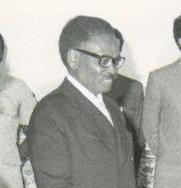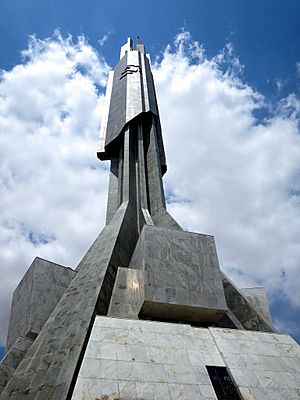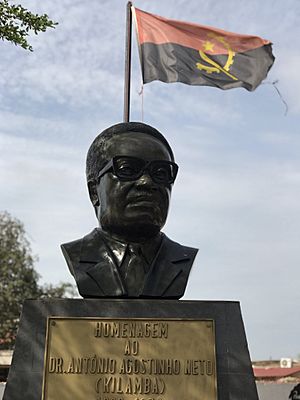Agostinho Neto facts for kids
Quick facts for kids
Agostinho Neto
|
|
|---|---|
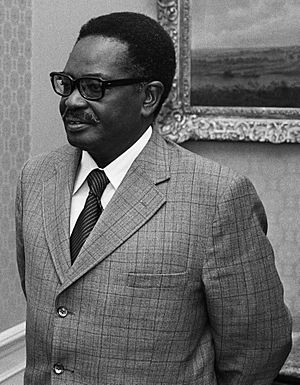
Neto in 1975
|
|
| 1st President of Angola | |
| In office 11 November 1975 – 10 September 1979 |
|
| Prime Minister | Lopo do Nascimento (1975–1978) |
| Preceded by | Position established |
| Succeeded by | Lúcio Lara (Acting) |
| Chairman of the People's Movement for the Liberation of Angola | |
| In office 10 December 1956 – 10 September 1979 |
|
| Preceded by | Position established |
| Succeeded by | Lúcio Lara (Acting) |
| Personal details | |
| Born |
António Agostinho Neto
17 September 1922 Ícolo e Bengo, Portuguese Angola |
| Died | 10 September 1979 (aged 56) Moscow, Russian SFSR, Soviet Union |
| Cause of death | Pancreatic cancer |
| Political party | MPLA |
| Spouse | Maria Eugénia da Silva (1957–1979; his death) |
| Relations | António Alberto Neto (nephew) |
| Children | Mario Mihaela Marinova |
| Alma mater | University of Lisbon |
| Military service | |
| Allegiance | |
| Years of service | 1961–1979 |
| Battles/wars | Angolan Civil War |
António Agostinho da Silva Neto (born September 17, 1922 – died September 10, 1979) was an important leader and a talented poet from Angola. He became the very first president of Angola in 1975. He led the country until his death in 1979.
Neto was also the leader of the Popular Movement for the Liberation of Angola (MPLA). This group fought for Angola's freedom from Portugal. He led them during the war for independence (1961–1974). After independence, he continued to lead the MPLA during the civil war (1975–2002).
Besides being a politician, Neto was a well-known poet. Many people consider him Angola's most important poet. His birthday is celebrated as National Heroes' Day, which is a public holiday in Angola.
Contents
Early Life and Education
Neto was born in 1922 in Ícolo e Bengo, a place in Bengo Province, Angola. His parents were both school teachers and Methodists. His father was also named Agostinho Neto and was a Methodist pastor.
He went to high school in Luanda, the capital city. After finishing school, he worked in health services for the colonial government. Later, he moved to Portugal to study medicine. He attended universities in Coimbra and Lisbon.
Activism and Arrests
While studying, Neto also secretly took part in political activities. He wanted Angola to be free from Portuguese rule. Because of his activism, the Portuguese secret police, called PIDE, arrested him several times.
- He was arrested in 1951 for three months.
- He was arrested again in 1952 for joining a youth movement that wanted democracy.
- He was arrested once more in 1955 and stayed in jail until 1957.
He finished his medical studies and married Maria Eugénia da Silva on the same day he graduated. In 1959, he returned to Angola. He was arrested again in 1960 but managed to escape. After his escape, he took charge of the fight against colonial rule. When Angola became independent in 1975, he became its president.
Political Leadership
In December 1956, two groups, the Angolan Communist Party and the Party of the United Struggle for Africans in Angola, joined together. They formed the Popular Movement for the Liberation of Angola (MPLA). Neto became its president.
Arrest and Exile
Portuguese authorities in Angola arrested Neto on June 8, 1960. Many of his patients and supporters marched to demand his release. However, Portuguese soldiers stopped them, killing 30 people and injuring 200. This event is known as the Massacre of Icolo e Bengo.
First, Portugal's government sent Neto away to Cape Verde. Then, he was sent back to jail in Lisbon. After many international protests, Neto was freed from prison but kept under house arrest. He escaped from house arrest and went to Morocco, then to Congo-Léopoldville.
International Relations
In 1962, Neto visited Washington, D.C., in the United States. He asked the Kennedy administration for help in his fight against Portugal. However, the U.S. government did not help him. This was because they had oil interests in colonial Angola. Instead, they chose to support another group called the National Liberation Front of Angola (FNLA).
Neto met Che Guevara in 1965. After this meeting, he started getting support from Cuba. He visited Havana many times, and he and Fidel Castro shared similar ideas about how a country should be run.
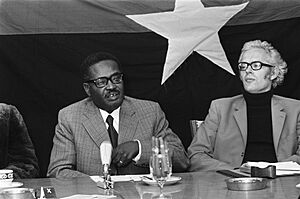
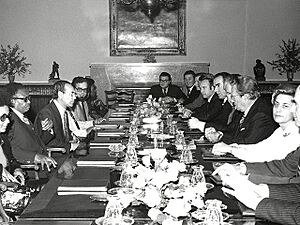
Angola's Independence
In April 1974, a revolution happened in Portugal. This led to Angola gaining full independence from Portugal on November 11, 1975. Neto became the leader of Angola after the MPLA took control of Luanda.
He set up a government where only one political party, the MPLA, was in power. His government became very close with the Soviet Union and other countries in the Eastern Bloc. Cuba especially helped the MPLA a lot in its fight against other groups like the FNLA and UNITA.
Neto declared that the MPLA's official way of thinking was Marxism-Leninism. In 1977, there was an attempted coup (a sudden, illegal takeover of power) by a group called Fractionism. This attempt was put down, and many people who were thought to be involved were arrested or worse. Neto later decided to close down the security directorate because of the "excesses" they had committed.
According to his sons, President Neto never used his position to give his family special businesses or advantages. This suggests that he remembered his humble beginnings.
Literary Achievements
Agostinho Neto wrote most of his poems between 1946 and 1960, mainly while he was in Portugal. He published three books of poetry during his life. Some of his poems even became national anthems for Angola.
One of his famous poetry collections is Sacred Hope, published in 1974. He was also the first person voted into the Anglo Writers Union and The Center for African Studies in Lisbon. He received the Lotus Prize from the Conference of Afro-Asian Writers.
Death
Agostinho Neto passed away on September 10, 1979, in Moscow. He had traveled to the Soviet Union for surgery to treat cancer and hepatitis. He died just a week before his 57th birthday.
Neto had been battling pancreatic cancer and chronic hepatitis for a long time. He had visited the Soviet Union many times for medical treatment because of their advanced doctors. Few people knew about his serious health problems. He and his colleagues kept it a secret so as not to show weakness.
Legacy and Recognition
The Soviet Union honored Neto with the Lenin Peace Prize for 1975–76.
Many places and things are named after him:
- The public university in Luanda, Agostinho Neto University, is named in his honor.
- A poem by Chinua Achebe is titled Agostinho Neto.
- An airport in Santo Antão, Cape Verde, is named after him. This is because of the good work he did there as a doctor.
- The main hospital in Praia, Cape Verde, is called "Hospital Agostinho Neto" (HAN) for the same reason.
- There is also a morna (a type of music) dedicated to him.
- A street in New Belgrade in Serbia is named Dr Agostina Neta street.
- A street in Ghana, called Agostinho Neto Road, is in Airport City in the capital.
In 1973, during a visit to Bulgaria, Neto had a daughter named Mihaela Radkova Marinova. She was raised in orphanages in Bulgaria. Neto's family has not officially recognized her. However, a DNA test in 2013 showed with 95% certainty that she is his daughter.
Foreign Honours
 Cape Verde
Cape Verde
 Cuba
Cuba
 Guinea
Guinea
 Namibia
Namibia
 Poland
Poland
 South Africa
South Africa
 Soviet Union
Soviet Union
 Yugoslavia
Yugoslavia
 Zimbabwe
Zimbabwe
- Recipient of the Royal Order of Munhumutapa
See also
 In Spanish: António Agostinho Neto para niños
In Spanish: António Agostinho Neto para niños
 | Ernest Everett Just |
 | Mary Jackson |
 | Emmett Chappelle |
 | Marie Maynard Daly |


